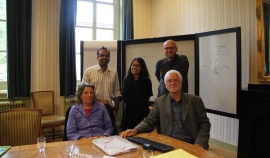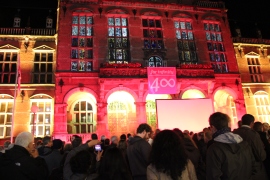Archive for August, 2014
Transformations of Religion and Culture in Contemporary India
The University of Groningen in collaboration with various Indian (including IIT Delhi), German and Dutch universities organized a summer school on the “Transformations of Religion and Culture in Contemporary India”. The summer school brought together a diverse group of students and teachers and discuss the various transformations that Indian society has been experiencing since the last few decades.
The summer school had a two-fold aim. Firstly, it introduced a variety of theoretical perspectives that have been employed in order to understand and analyse such complex processes of social change and continuity in India. These general approaches and concepts can also be employed to contexts other than India. Secondly, it dealt with diverse fields in which such changes are particularly manifested:
- citizenship, democracy and development;
- identity, indigeneity and the publicization of religion (new media);
- local and global discourses of health and madness;
- nationalism, conversion and violence;
- caste, inequality and hierarchy.
The summer school was coordinated by Dr. Peter Berger who is the Director of the Centre for the Study of Religion and Culture in Asia at the Faculty of Theology and Religious Studies, the University of Groningen, the Netherlands. Some other scholars from India (Dr. Sarbeswar SAHOO, IIT Delhi; Dr. Sobin George, ISEC Bangalore; Dr. Meera Baindur, Manipal University), Germany (Prof. Frank Heideman, Munich University; Prof. Helene Basu, the University of Münster) and the Netherlands (Prof. Pieter Boele van Hensbroek, the University of Groningen) also joined Dr. Berger in discussing the various theoretical and methodological approaches to the study of Indian society.
Around ten students from India, Switzerland, Germany, USA, and the Netherlands participated in the summer school. On the last day, a students’ conference was organised where we had the opportunity to listen to the excellent research work of the students.
For both students and teachers, this summer school provided an intellectual platform to critically engage with the developments in India and also build long-term scholarly networks. It was also a happy coincidence that the 400th birthday of the University of Groningen occurred during the summer school. We enjoyed the celebration and witnessed a glimpse of the proud history of the university.


